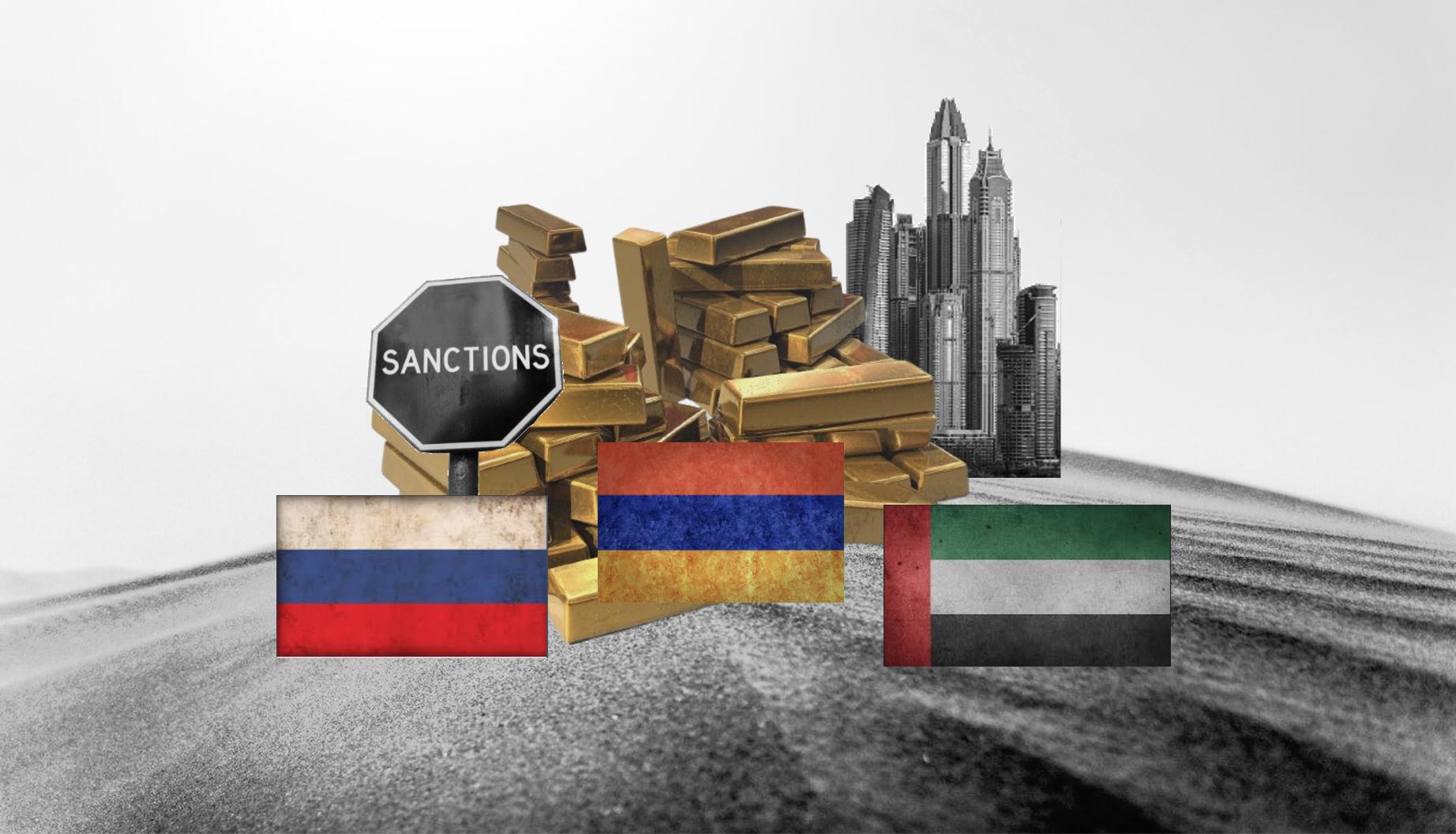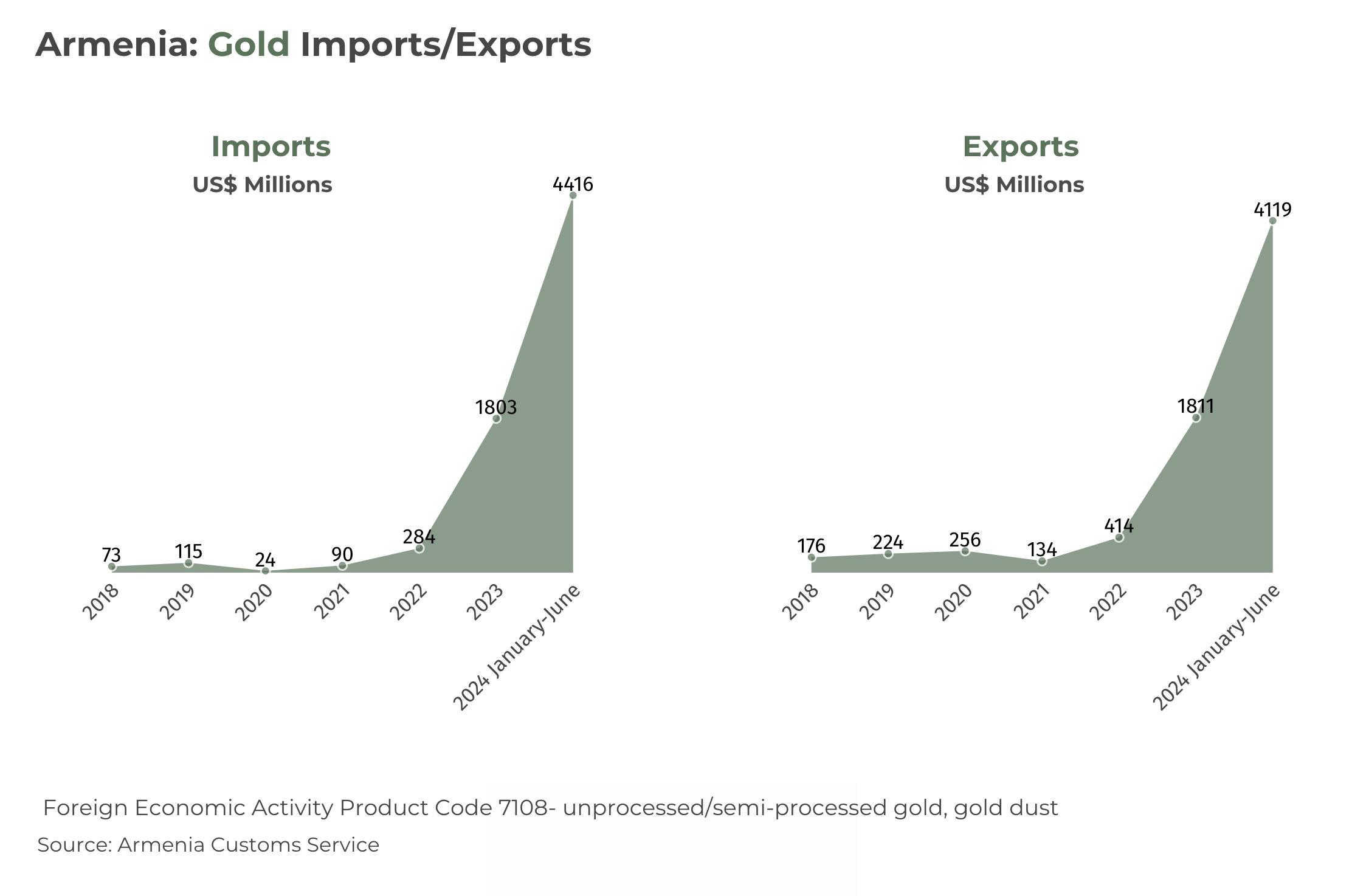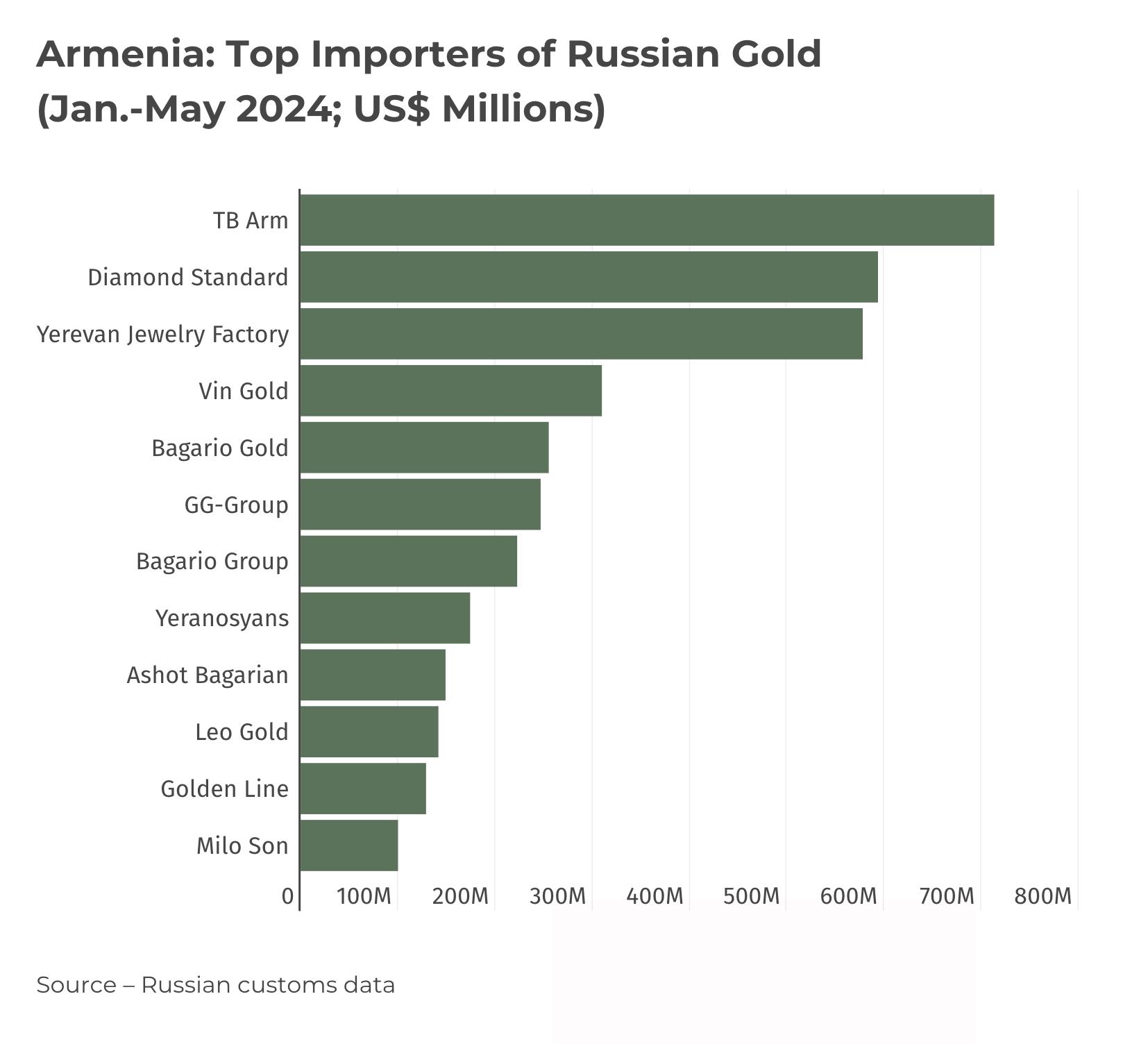
Armenia: Re-exporting Billions of “Dirty” Russian Gold
By Seda Hergnyan (Hetq), Andrei Zayakin (The Insider)
Hetq, and the Russia-focused independent media outlet The Insider, have revealed that companies in Armenia are aiding Russia to circumvent gold trade sanctions the West imposed following Moscow’s invasion of Ukraine.
Billions of dollars’ worth of Russian gold has been shipped to Armenia since 2022. None of it remains in the country.
It is profitable for Russia to trade gold through Armenia, since Armenia does not charge export duties, and trade through private individuals allows one to avoid sanctions.
Billions of dollars of “dirty” gold is leaving Russia via Armenia
Gold is one of the leading exports of Russia.
In June 2022, the United States imposed a ban on the import of Russian gold. Technically, this embargo applies only to imports by the United States. However, if another country buys this “dirty” gold, it cannot sell it in the United States. This, in turn, means that banks will not buy it for investment or trade. Thus, unlike import restrictions on other goods, the American embargo on bank gold automatically becomes global.
In 2022-2023, the flow of Russian gold shifted to the East. Before the outbreak of full-scale war in Ukraine, it was exported mainly to the UK, but since 2022, the UAE, Hong Kong and Turkey have become the main recipients. However, as the data shows, these flows stopped in April 2023. Since then, not a single ounce of Russian gold has been exported outside the Russian-led Eurasian Economic Union.
In 2020, according to Russian customs data obtained by The Insider, Russia sold $18 billion in gold outside the Eurasian Economic Union (EAEU), and $17 billion in 2021. The following year, it dropped to $7 billion and to $2 billion in 2023. In April 2023, as mentioned, exports outside the EAEU were stopped.
At the same time, Armenia became a major exporter of gold.
According to the Armenian Customs Service, Armenia sharply increased its gold imports in 2023, and in the first half of 2024 it reached $4.4 billion (about sixty-six tons). This is not finished processed gold, which was almost entirely imported from Russia. This is also confirmed by the data of the UN Comtrade database.
During the same period, this gold was shipped from Armenia. In the first half of this year, $4.1 billion worth of gold (59 tons) was exported from Armenia.
Armenian politicians and businesspeople with ties to Russia are acquiring Russian gold
Insider and Hetq found that among the largest importers of Russian gold to Armenia in 2024 (we are talking about companies that imported more than $100 million in gold in January-May 2024) are companies affiliated with prominent Armenian politicians and oligarchs, as well as businesses with ties to Russia.
One of the largest companies importing gold to Armenia is Yerevan Jewelry Factory LLC (YJF), which is linked to the family of Khachatur Sukiasyan, a member of Armenia’s ruling Civil Contract party. The factory has purchased gold from about three dozen Russian companies.
The factory was officially opened two years ago, in a new building at the "Yerevan" market. The ribbon was cut by former Armenian Minister of Economy Vahan Kerobyan, chairperson of the board of Sil Kapital Eduard Sukiasyan, brother of Civil Contract deputy and businessman Khachatur Sukiasyan, and Hrach Avagyan, who introduced himself as the co-founder of the factory in interviews with journalists. The latter's family was engaged in jewelry making in Russia.
Earlier this year, Hetq revealed that the YJF also re-exports a large amount of jewelry of Russian origin from Armenia, which was counted as local production in Armenia’s industrial statistics. It’s exported under other codes of foreign economic activity, and therefore are not included in the gold indicators mentioned in this article.
Apparently, the YJF tried to hide the origin of the Russian jewelry products, which would ensure unhindered export. In addition to jewelry and ornaments, they also worked with the Russian side in the raw gold sector.
Khachatur Sukiasyan has been engaged in various businesses since the mid-90s. He and his brothers own Armeconombank and Sil Insurance, both in Armenia. Most of their businesses are part of the holding company Sil Concern. Sukiasyan owns the Rossia and Rossia Mall shopping centers in downtown Yerevan, the Yerevan shopping mall, the Adidas store and the representative office of this brand in Armenia, the Sil Plaza business center, the Fly One Armenia airline, among many other businesses.
It is noteworthy that Armenian banks were not major importers or exporters in this gold trade.
In 2024, Tibi Arm LLC was also a major importer and exporter in this chain of gold trade in Armenia. According to the state register of companies operating in Armenia, it was registered in May 2022. The company is now fully owned by Armen Tadevosyan, a citizen of Armenia.
Little is known about Armen Tadevosyan. Registry data shows that he is also the director of the company. However, it is interesting that George Stanley, supposedly a citizen of the UAE, had a share in the company for a brief time, since his passport was issued in Dubai. In January 2024, he acquired a 60% stake in Tibi Arm, which he sold to Armen Tadevosyan six months later.
Until October of this year, the director of the company was Armenian citizen Artak Harutyunyan.
Armen Tadevosyan, George Stanley and Artak Harutyunyan are partners. They are involved in Transmineral and Ecovilla Residences, LLCs registered in Armenia. Armen Tadevosyan also fully owns South Mine LLC.
Ecolur, an Armenia-based environmental news website, reports the company has applied for a permit to reassess the mineral reserves in Armenia’s Syunik Province.
Between January and May 2024, according to Russian customs data at our disposal, Tibi Arm imported more than seven hundred million dollars of gold from Russia, mainly from Russian banks. Tibi Arm does not have a website and there is no information about it on the Internet.
Hetq was able to contact a company representative only through companies affiliated with Armen Tadevosyan. In an interview with Hetq, the person who introduced himself as the company director, stated on behalf of the company owner Armen Tadevosyan that they did not wish to comment on their activities. Before the phone call, we had also written to Armen Tadevosyan, but that letter also went unanswered.
According to Hetq’s information, Tibi Arm is linked to another company engaged in gold trading. Due to incomplete evidence, we will address this company later in a separate article.
Hetq tried to contact this company and others that import and export gold. The conversations showed that the companies disinclined to discuss gold trading, the risks of sanctions, and cooperation with Russia and the West.
Diamond Standard LLC is one of Armenia’s largest gold importers. In an interview with Hetq, owner Anahit Chitchyan said that in 2022-2024 the company operated exclusively within the framework of the law. She refused to answer any questions, claiming the company has not conducted any imports or exports since the first half of this year.
Anahit Chitchyan owns the accounting firm Plus-Minus LLC. According to Armenia’s State Revenue Committee, this is a small company operating in the turnover tax system. Chitchyan also owns Kobi LLC, which is registered with the tax service as a company engaged in wholesale trade of cars.
Diamond Standard was registered in June 2022. Initially, it had two other owners: Rakesh Kumar Sharma and Islambek Saparboy Otazhanov, registered in Russia. Immediately after its establishment, the company began exporting gold from Armenia. In April 2023, the company was completely transferred to Anahit Chitchyan. Her LinkedIn page indicates that she also works at the Armenian-Russian University.
Zohrab Torosyan, director of the large importer Win-Gold LLC, told us by telephone that the company has been inactive since the second half of the year. Torosyan said Win-Gold and the GG-group, companies owned by Armenian citizen Gor Sharyan, exported unprocessed gold.
Both companies purchased gold from Russian suppliers. Win-Gold was founded in 2022 and GG-group in 2023.
Most companies in Armenia involved in gold trading were opened after 2022, which means they were founded expressly to export sanctioned Russian gold to other countries.
Their names are little known, but rumors circulating behind the scenes claim they are backed by former Armenian officials who, in one way or another, assisted in obtaining licenses and unhindered exports. Unfortunately, our sources prefer to remain tight-lipped and don’t reveal much information.
Among the major companies importing gold from Russia to Armenia are the companies Bagario Gol and Bagario Group LLC, registered in Gyumri, which belong to Volodya Bagaryan. Another is Ashot Bagaryan LLC, also registered in Gyumri.
The gold doesn’t stay in Armenia
As noted above, the imported gold does not stay in Armenia, neither in the form of jewelry nor in the banks. According to the Armenian Customs Service, 64% of the $4.1 billion worth of gold (59 tons) exported from Armenia in the first half of 2024 was exported to the United Arab Emirates (UAE), with the rest going to Hong Kong and China.
Golden Heritage is also one of the largest companies exporting gold from Armenia. Although it is not on the list of major importers according to 2024 data, it operated in large volumes in the years prior to that. In 2020, Hetq revealed that the company was exporting large volumes of gold from Armenia. Later, in an interview with Hetq, the company owner said it imported gold from Switzerland and exported it to Russia. In 2022, the company imported and exported Russian gold to Turkey.
Golden Heritage is owned by Vitaly Grigoryants, a well-known Armenian businessman in Russia, and his junior partner Arsen Mikaelyan. At one time, they also owned Armbusinessbank (ABB), which operates in Armenia and is now renamed AMIO Bank.
Dodging customs duties
Economist Aghasi Tavadyan notes that Russian businesspeople used Armenia as a transit country for exporting gold, as Russia had imposed a customs duty on gold exports. However, it did not apply to exports to EAEU countries like Armenia.
“Russian businesspeople first brought this gold to Armenia, and then exported it to the Emirates. This was beneficial for them since no customs duty is charged on gold exports from Armenia. It turned out that customs duties were paid neither when exporting to Armenia, nor from Armenia to the UAE,” the economist says.
Tavadyan notes that after May of this year, the volumes of gold imported into and exported from Armenia have fallen sharply. This is also evidenced by the monthly data of the Statistical Committee. In January 2024, 16.8 tons of gold were imported into Armenia. In September it fell to 2.4 tons.
Tavadyan says this is most likely due to new legislative changes in Russia for duties and fees set for the export and extraction of gold, which may have made exports through Armenia unprofitable. In conversations with Hetq, importers refused to say why they reduced imports beginning in the second half of the year.
The Central Bank of Armenia does not publish statistics on how much money legal entities have transferred abroad and how much they have received. Therefore, the lack of data does not allow us to identify what movement of money has been recorded in the context of the sharp increase in gold trade. Experts do not exclude that these amounts were received and transferred through the Armenian banking system, but they do not rule out that Russian businesspeople may keep the money received from their exported gold abroad, investing it in various sectors.
Of note is that Armenia has become a transit country not only for the export of Russian gold and jewelry, but also for the export of diamonds.
Armenia’s Economy Ministry doesn’t see a major threat
The Armenian Ministry of Economy, in response to our inquiry, states that the export of sanctioned Russian gold isn’t a major issue and can only threaten Armenia with secondary sanctions. However, no such cases have been registered so far, which, according to the ministry, indicates that the tools introduced by the government are effective.
“The RA Ministry of Economy is constantly monitoring developments in order to respond more flexibly to the situation,” responded Haykaz Nasibyan, Secretary General of the Ministry of Economy.
 Videos
Videos Photos
Photos


Write a comment